Cantilever Park: Warrington Town
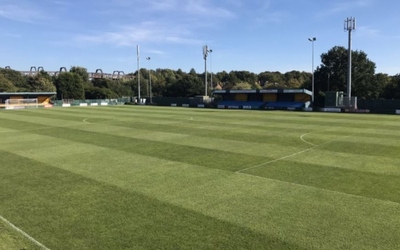
From Warrington Town FC
Warrington is close to both Liverpool and Manchester, which means that if you’re keen to see some football then the likelihood is that you’re going to head to either city to see some. Of course, Liverpool and Manchester United regularly sell out their home matches, meaning that you might prefer to look for a smaller side in order to watch the sport. If neither Everton nor Manchester City take your fancy then you might well choose to head to Cantilever Park to see Warrington Town play. It has been the club’s home since 1956, with Warrington Town having played in a number of different places before then.
It isn’t outrageous to suggest that Warrington is a town that concentrates on rugby first and foremost. That might well help to explain why Warrington Town wasn’t formed until 1949 by Jimmy Drinkwater. Initially known as Stockton Heath Albion, the name change was decided upon after the club’s Annual General Meeting in 1961. As you might imagine for a club located where it is, the successes that Warrington Town have enjoyed over the years have been somewhat limited, but nevertheless relatively worth celebrating. The likes of the Northern Premier League and the Mid-Cheshire League have all been won over the years.
Stats
| Cantilever Park Stats | |
|---|---|
| Year Opened | 1956 |
| Capacity | 2550 |
| Average Attendance | 1157 |
| Record Attendance | 2550 (Warrington Town v Bamber Bridge (01/05/2023)) |
| Pitch Size | 101 x 64 (6464) |
| Owner | Warrington Town FC |
| Clubs Hosted | Warrington Town |
| Warrington Town FC Stats | |
|---|---|
| Year Founded | 1949 |
| Nickname | The Yellows, The Town, The Wire |
| Club Mascot | The Legend |
| Rivals | St Helens Town |
| Previous Stadiums | Stockton Lane, London Road, Cheshire Police Ground |
| Kit | Yellow & Blue (Home) / Blue & White (Away) |
| Training Ground | Warrington Sports Club |
| Shirt Sponsor | RSK |
| Team Owner | Toby Macormac |
| Record Goalscorer | Steve Hughes / Les Arnold (163) |
| Record Appearances | Dave Tickle (342) |
Cantilever Park Photos
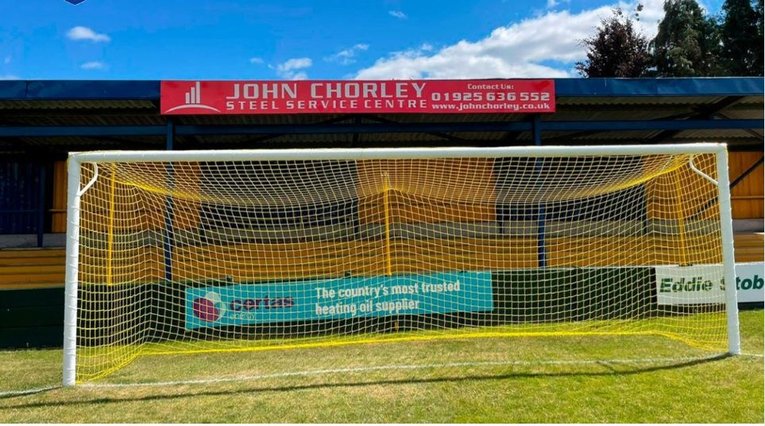
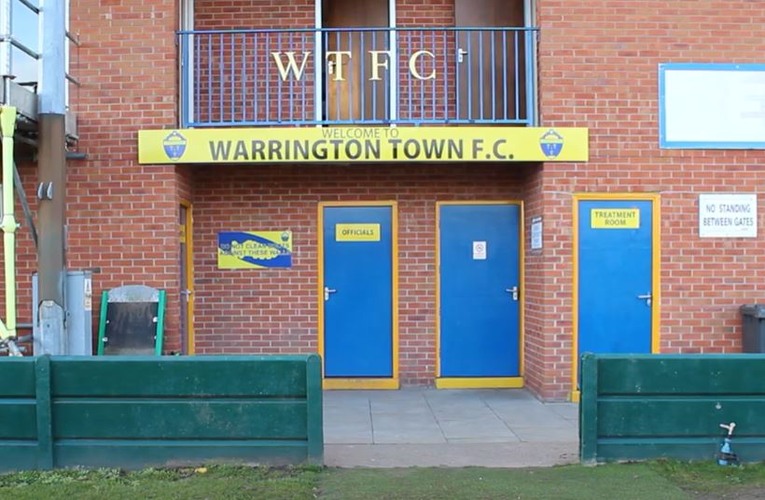
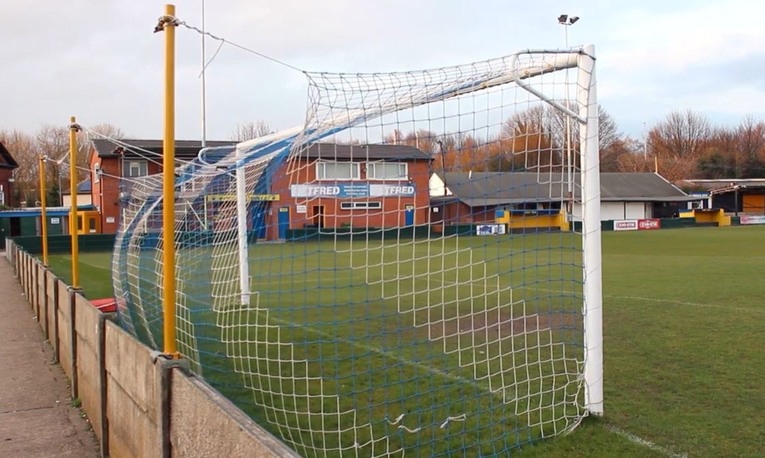
Cantilever Park Seating Plan and Where to Sit
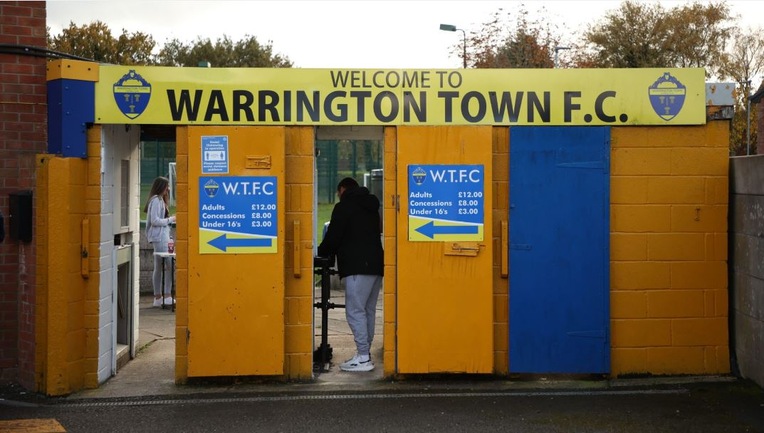
There are three covered stands with seating available at Cantilever Park, although as you might expect from a non-league ground, they do not take up the full width and breadth of the pitch.
The majority of the available space is for standing spectators, including the entirety of the away end behind the goal.
Warrington Town FC Ticket Prices
There isn’t much messing around from Warrington Town when it comes to ticket prices. How much you’ll pay to get in will depend on your personal circumstances, with the following being a guide to how much people were asked to pay during the 2023-2024 season, mainly based on their age:
- Adult – £12
- Concession – £8
- Under 16-year-olds – £3
As is the case with a lot of clubs in the lower leagues, tickets are cheaper if you book online. You’ll pay £3 more if you pay on the gate, but you should also bear in mind that you’ll pay a £1 booking fee if you buy your tickets online.
How To Get Warrington Town FC Tickets
How you get your tickets for Warrington Town will largely be down to your own personality. It is likely that the younger amongst you might well want to head to the club’s website, from where you can buy tickets for all of the matches. If you’re a little bit older, however, you’ll no doubt be pleased to learn that you can still buy tickets on the gate if that is your preferred method.
Where to Buy
Getting To Cantilever Park
Train – For anyone looking to get the train to a Warrington Town match, Warrington Central is where you’ll want to be heading to. There are a couple of stations that serve Warrington, but Central is the best for the stadium. From there, you’ll have either a car ride of about ten minutes or so or a much longer walk, which is liable to take up to 40 minutes at a steady pace.
Bus -If you’re looking to get the bus to the ground then you’ll be able to get the Number 11 or the Number 12 from Warrington Interchange, getting off at Pearson Avenue and then walking a short distance the rest of the way.
Car – Warrington Town’s Cantilever Park is actually on the outskirts of Warrington, meaning that you’ll likely take the M56 or the M6 to get close, depending on where you’re coming from. You meet even end up on the M62, but it is the B5156 that you’ll be aiming for as you get closer to the ground. Keep your eyes out for signposts, but remember that there are a number of sporting grounds in Warrington so ensure you’ve got the right one.
By Air – If you’re something of a sadist then there’s good news for you, with Manchester Airport being one of the closest ones to Warrington. If, on the other hand, you’re a normal person then you’re probably going to want to travel that little bit further and fly into Liverpool John Lennon Airport instead.
Taxi – The short car ride from Warrington Central out to Cantilever Park doesn’t mean that you’re not going to get ripped off by the taxi drivers. As a result, you’ll probably end up spending around £10 to get a taxi from the station to the ground.
Parking Near Cantilever Park
There is a small car park at the ground, but it isn’t really for supporters to use. As a result, you might want to have a look out for some on-street parking if there aren’t any restrictions in place. Failing that, you would do well to keep your eyes peeled for some of the car parks in the centre of Warrington itself, which will usually have deals on on match days to ensure that Warrington Town fans can park there without having to pay through the nose to do so.
Useful Resources
- Parking - Just Park
Pubs and Bars Near Cantilever Park
The Tavern Sports Bar
Austins
The Brass Monkey
About Warrington Town FC
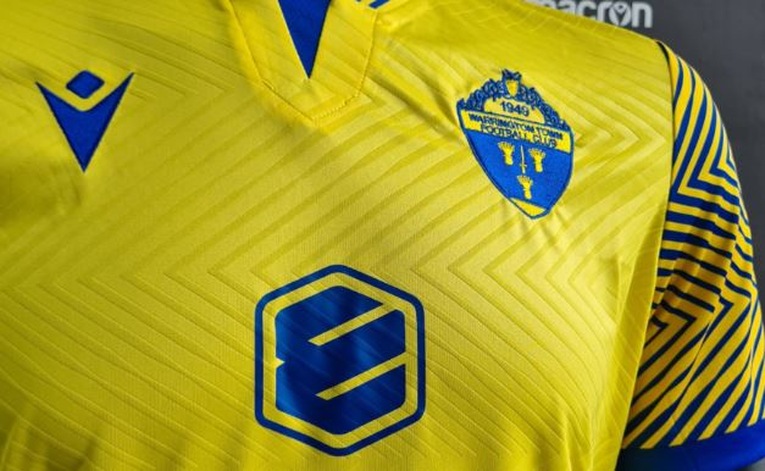
In 1949, Jimmy Drinkwater decided that he wanted to form a football team in a town that is best-known as being where rugby is played. He set up Stockton Heath Albion Football Club, getting it to complete in the Warrington and District League for the first four years. In 1953 a move was made to the Mid Cheshire League, with Freddie Worrall taking over as manager in a spell that would last for 13 years. The club won but the league and the League Cup three times under his time in the hot seat, so it’s little wonder that he is thought of fondly by supporters. The one thing that a lot of people didn’t like, though, was the ridiculous name.
As a result, the 1961 Annual General Meeting was used as a chance to change the name of the club to Warrington Town, which it has been known as ever since. In 1978, Warrington Town became founding members of Division Two of the Cheshire County League. That merged into the North West Counties Football League in 1982, at which point Warrington Town became founder members of Division Three. Over the years, the club has enjoyed some relative success, though obviously not at the same level as local teams such as Liverpool and Manchester United. They have won the likes of the North West Counties League and the Mid-Cheshire League, for example.
Cantilever Park History
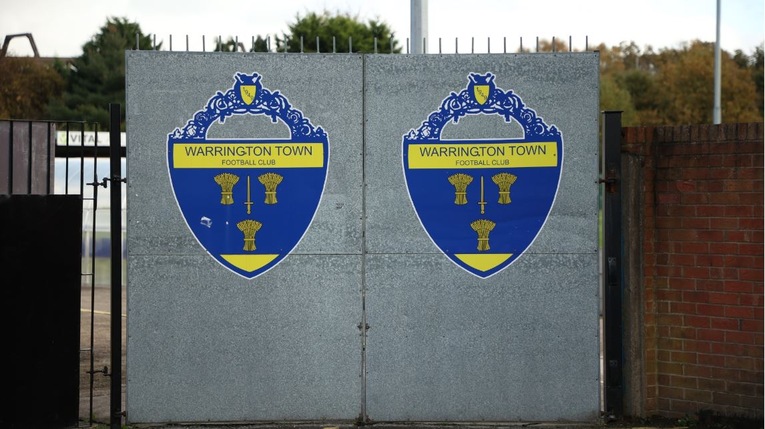
The truth about Cantilever Park is that there isn’t a huge amount that we can tell you about it. When the club was first formed, games were played at Stockton Lane in Stockton Heath. In 1950 they moved to London Road, but eventually played games in its own ground in 1953, which was when the side played at Loushers Lane, the Cheshire Police Ground. It was the following year when the club, still known as Stockton Heath Albion at the time, moved to Cantilever Park. The name of the stadium comes from the Cantilever Bridge, which is a high-level road bridge on Ackers Road that runs over the Manchester Ship Canal.
You can see the bridge that the stadium takes its name from towering over the ground if you look to the east. The stadium is located on the northern bank of the Manchester Ship Canal. In terms of what you’ll find were you to pay a visit, there are three stands on offer to supporters. If you’re the sort of person that needs to sit down whilst you watch football matches, perhaps for health reasons or because of your age, then the bad news is that only one of the stands inside Cantilever Park offers seating. The other two, as you might imagine, are terraces, meaning that those supporters within them have to stand up for the 90 minutes of the game.
